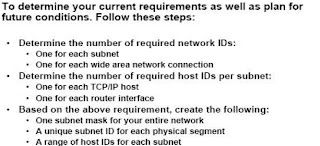CCNA Certification
CCNA is the entry-level Cisco certification and is the foundation for CCNP as well as CCIP and CCVP Certifications.
A CCNA candidate will achieve familiarity and expertise with Cisco's IOS, TCP/IP, LAN and WAN technologies and management, switching and routing protocols, the OSI model, LAN troubleshooting.
CCNA certifies that the candidate has the ability to select, connect, configure, and troubleshoot various Cisco networking devices.
Popular combinations with CCNA are MCSE, RHCE and CCNP
CCNA Recertification
CCNA certifications are valid for three years. To recertify, either pass the current CCNA exam.
Basic Network Concepts
Routing
Dynamic Routing
Password Recovery
Cisco Discovery Protocol (CDP)
IPv6
Switch
Inter - VLAN Routing
Spanning Tree Protocol (STP)
Wireless LAN (WLAN)
A CCNA candidate will achieve familiarity and expertise with Cisco's IOS, TCP/IP, LAN and WAN technologies and management, switching and routing protocols, the OSI model, LAN troubleshooting.
CCNA certifies that the candidate has the ability to select, connect, configure, and troubleshoot various Cisco networking devices.
Popular combinations with CCNA are MCSE, RHCE and CCNP
CCNA PrerequisitesBasic Computer Knowledge | |
| CCNA Exams & Recommended Training | |
CCNA certifications are valid for three years. To recertify, either pass the current CCNA exam.
Cisco Training - CCNA Course Details
Basic Network Concepts
- Importance of OSI
- OSI & TCP/IP
- IP Address & Classes
- Subnet Mask
- Default Gateway
- FLSM / VLSM
- CIDR
- Roles
- Software & Hardware Routers
- Cisco IOS Commands
- Router Vendors
- Cisco Hierarchical Design Model
- Fixed & Modular Router
- Router Interfaces
- Internal & External Components
- Boot Process
- Basic Router Commands
Routing
- Guide Line of Routing
- Types of Routing
- Administrative Distance
- Disadvantage of Static
Dynamic Routing
- Advantage of Dynamic Routing
- Types of Dynamic Routing Protocol
- RIPv1
- Metric Calculation
- Timers
- Routing Loops
Advance Distance Vector Routing Protocol
- RIPv2
- EIGRP
- Calculation of Metric
- Link State Routing Protocol
- OSPF
- Features of OSPF
- Metric Calculation
- Standard
- Extended
- Access Class
- Type of NAT
- Static
- Dynamic
- PAT
- Advantage Of Frame Relay
- Virtual Circuit
Password Recovery
Cisco Discovery Protocol (CDP)
IPv6
Switch
- Hub & Switches
- Broadcast Domain
- Collision Domain
- Initial Configuration of Switch
- IEEE 802.1q Trunking
Inter - VLAN Routing
Spanning Tree Protocol (STP)
Wireless LAN (WLAN)




Comments
Post a Comment